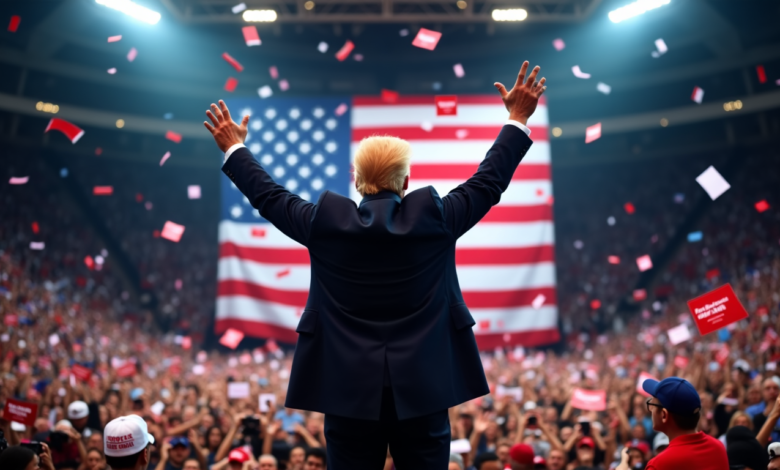
Donald Trump Sweeps to Victory in Remarkable Political Comeback
Donald Trump has achieved one of the most important political comebacks in American history. The former president won decisively in battleground states and altered the political map completely. His victory shows a fundamental change in the nation’s political direction that will lead to major changes in American governance.
Trump’s win will change much more than just the White House’s operations. His campaign messages about the economy and immigration appealed to voters strongly. The ongoing Supreme Court battles and Republican Party’s internal dynamics played a vital role in the outcome. Global markets and international capitals reacted immediately to his victory, while world leaders prepare for possible changes in America’s foreign policy approach.
Trump’s Path to Victory
Trump’s path back to the White House became clear as he won several battleground states. His campaign team’s focus on specific states played a decisive role in the final outcome.
Battleground states fell to Trump one after another:
- North Carolina was the first to be called
- Georgia followed with a decisive margin
- Pennsylvania’s flip sealed the victory
- Wisconsin pushed him over the required threshold
Trump’s electoral college numbers told the winning story with 279 votes compared to Harris’s 223, while some states continued their count. His victory needed careful planning on the electoral map. Starting with his 2020 base of 235 electoral votes, Trump needed to win back specific states. The winning moment came when he captured three states he had lost by less than 1 percentage point in 2020 – Wisconsin, Arizona, and Georgia. These wins took him past the vital 270-vote mark.
Trump stands ready to achieve something no Republican has done since George W. Bush in 2004 – winning both the electoral college and the popular vote. His lead of about 5 million votes shows broad support from various demographic groups. Hispanic voters and lower-income households affected by inflation backed him strongly, which points to a fundamental change in traditional voting patterns.
Almost 80 million Americans cast early and mail-in ballots in this historic comeback. Trump built a winning coalition by dominating rural areas and non-college educated voters. He also made unexpected gains among traditional Democratic voters, which helped secure both electoral and popular vote majorities decisively.
Factors Behind Trump’s Comeback
Multiple factors drove Trump’s unprecedented return to power. Economic concerns and immigration policy directly influenced voter decisions. The campaign emphasized kitchen-table issues that appealed to voters worried about their financial future.
Economic messaging
Trump built his economic platform around voters’ worries about inflation and living costs. His campaign made several big economic promises:
- Tax cuts that would benefit Social Security recipients and overtime earnings
- A 15% corporate tax rate reduction for American manufacturers
- New tariffs on all imports
- Interest deductions for people with car loans
Critics called his economic message too simple. However, polls showed voters trusted Trump more than Harris on economic matters, especially his plans for inflation control and job growth.
Immigration stance
Immigration became a defining campaign issue when Trump’s tough border policies gained strong support from voters. His plans to finish the border wall and deport immigrants appealed especially when you have voters in border states. Recent polls showed 55% of people in these states wanted lower immigration numbers—reaching the highest level in almost 20 years.
Voter frustration with incumbent administration
The current administration struggled with inflation and border security issues that became major weak points. Most voters reported feeling financially worse off compared to four years ago. This sentiment persisted despite positive economic indicators. Trump’s campaign made the most of this disconnect. His message about economic nationalism and strict immigration control resonated well, even with traditionally Democratic voters.
Trump knew how to grow his support base, which proved vital to his success. Hispanic voters showed more support compared to 2020, despite his controversial campaign rhetoric. His focus on economic opportunities and border security helped him surpass typical demographic voting patterns. These factors substantially contributed to his historic comeback win.
Implications of Trump’s Win
Trump’s return to the White House will revolutionize federal governance. His administration plans to make major changes in many sectors. His victory will affect everything from policy reforms to staffing decisions and has already altered the map of American politics.
Policy priorities for second term
The president-elect has prepared a comprehensive set of executive orders and policy changes that will take effect immediately. His administration plans to focus on:
- Implementing a 10-20% tariff on all imports
- Expanding deportation operations nationwide
- Freezing climate-related regulations
- Restructuring federal health agencies
- Reforming the education system’s ideological framework
Trump’s team has created detailed policy papers and regulation reversals ready to launch after inauguration. This approach demonstrates a more strategic vision compared to his first term.
Potential cabinet appointments
Steadfast loyalty stands as the main criterion in the incoming administration’s cabinet selection process. Past experiences with appointees who opposed Trump’s agenda have shaped this approach. The president-elect shows readiness to bypass traditional confirmation processes and may use acting appointments to implement his agenda quickly.
Trump’s interest in Elon Musk and Robert F. Kennedy Jr. for top positions marks a clear break from typical cabinet choices. His administration aims to transform up to 50,000 civil service positions into political appointments that would strengthen control over federal agencies.
Effect on ongoing legal cases
Trump’s victory changes the landscape of his legal battles. The federal cases from Special Counsel Jack Smith could end once Trump takes office because he will have the power to direct his Justice Department to stop these prosecutions.
The state-level cases present a different challenge. Both the Georgia election interference case and New York’s civil fraud case raise new constitutional questions about prosecuting a sitting president. Legal experts believe these cases will likely pause until Trump’s presidency ends. Civil suits might continue based on Supreme Court precedent from the Clinton era.
Trump’s legal team plans to use his presidential position to fight these cases, especially in state courts where the constitutional questions about prosecuting a sitting president remain unclear.
Global Reactions and Market Response
Donald Trump’s electoral victory made world leaders and global markets quick to react, leading to most important changes in international relations and financial indicators. His historic return to power showed far-reaching implications.
International leader statements
World leaders rushed to congratulate Trump with different levels of enthusiasm. Israeli Prime Minister Benjamin Netanyahu celebrated it as “history’s greatest comeback.” European leaders showed a more reserved response. British Prime Minister Keir Starmer highlighted the US-UK’s special bond and promised to work “shoulder to shoulder” on common values.
Ukrainian President Volodymyr Zelenskyy showed support for Trump’s “peace through strength” strategy. NATO Secretary-General Mark Rutte emphasized Trump’s role in strengthening the alliance. The Kremlin stayed distant as spokesman Dmitry Peskov refused to offer congratulations because he considered the US an “unfriendly country.”
Stock market and economic indicators
Trump’s victory triggered dramatic responses in financial markets with most important movements in multiple sectors:
- S&P 500 futures climbed to record highs near 6,000
- Dow futures shot up by more than 1,200 points
- Russell 2000 small-cap index gained 5.4%
- Bitcoin reached all-time highs
- VIX volatility index fell to its lowest point since September
Geopolitical shifts
Trump’s victory could revolutionize international relations. His universal tariff policy and views on NATO funding worry European allies. The president-elect’s tough stance on China makes analysts predict possible yuan depreciation and new trade tensions.
The Middle East might look different soon. Trump promises quick solutions to regional conflicts. Saudi Arabia wants deeper bilateral ties, but European nations remain careful. They stress the need for strong transatlantic partnerships despite disagreements over policies.
Wall Street expects major policy changes. Goldman Sachs believes Trump’s corporate tax cut to 15% might boost S&P 500 earnings by 4%. But experts warn that trade barriers and tensions could reduce these benefits for global companies.
Donald Trump’s remarkable return to the White House marks a defining moment in American political history. He won decisively by capturing both the electoral college and popular vote. This gives him a clear mandate to pursue his agenda of economic nationalism and strict immigration control. His unprecedented backing from Hispanic voters and working-class Americans shows a major shift in traditional voting patterns. These new alignments could reshape party politics over the next several years.
This historic comeback will impact both domestic and international affairs deeply. Trump plans sweeping changes through universal tariffs and extensive executive orders that will alter how America governs itself. Global markets have already reacted, and countries worldwide are responding to his victory. The road ahead looks complex with ongoing legal challenges and upcoming cabinet appointments. His win represents more than just a political victory – it will likely set America’s policy direction for the next four years.





